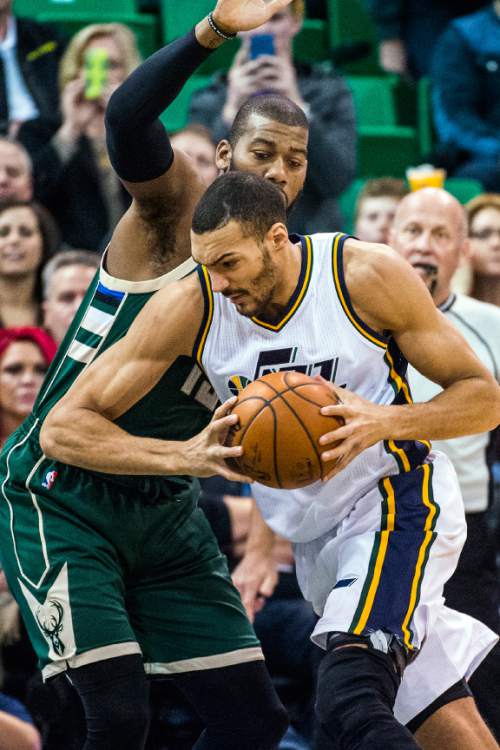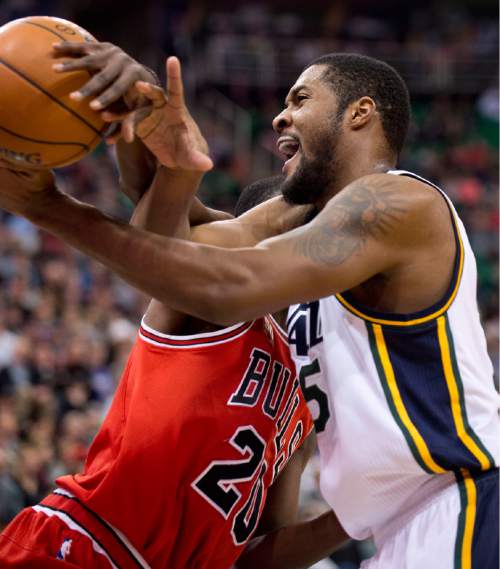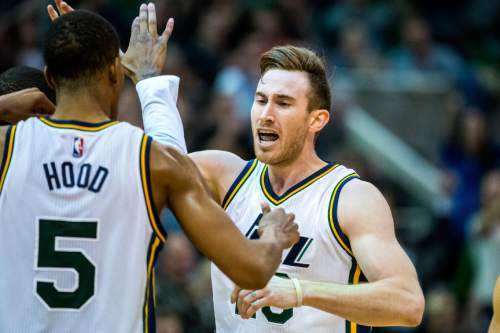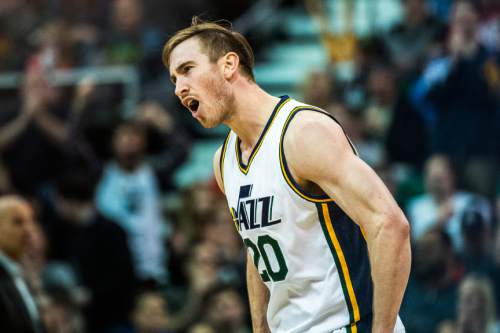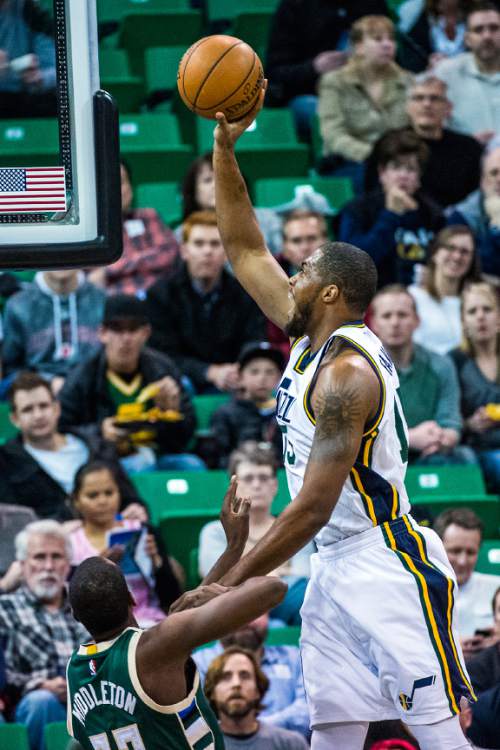This is an archived article that was published on sltrib.com in 2016, and information in the article may be outdated. It is provided only for personal research purposes and may not be reprinted.
By losing their final game before the NBA's All-Star break, the Jazz succeeded in landing at a symbolic point in their ongoing rebuilding project.
The Jazz's .500 record (26-26) is not quite their best mark at this stage of any season since they traded All-Star point guard Deron Williams and basically started over. Yet this latest checkpoint of mediocrity represents progress in a subjective way. They've gone from being hopelessly average to hopefully average.
The franchise's growth is encouraging, after five years of starts and stops, changes in player personnel and staff inconsistency that stemmed from the February 2011 deal that sent Williams to the Nets for a package featuring Derrick Favors. In five years, the Jazz have failed to win even one playoff game — joining Charlotte, Detroit, Minnesota and Sacramento with that distinction. In that sense, it has been a long, frustrating process, requiring considerable trust and patience from fans.
Yet the franchise subjected everyone to only one truly horrible season, following the departures of Paul Millsap and Al Jefferson via free agency. That makes the rebuilding reasonably tolerable — now that those trying times are in the past, anyway.
Breaking even at this point of 2015-16 is an achievement, considering how injuries to Rudy Gobert, Alec Burks and Favors could have wrecked the season. Cooperation from the bottom half of the Western Conference, the team's improving health and Quin Snyder's coaching have enabled the Jazz to rise above the playoff cut with 30 games remaining.
The immediate challenge is to make the playoffs. The Jazz absolutely must do so, to make this season a success. The bigger question is what will happen to the Jazz in the next five years, after what they've been through the past five years — and factoring in the lessons of the five years before then. Five discussion points:
Boozer/Williams appreciation
The Jazz's struggles of the past five years were judged as necessary to make the franchise sustainably good; I get that. The success of the Carlos Boozer/Williams teams came with a ceiling, in the view of then-general manager Kevin O'Connor, and Dennis Lindsey has followed through with that vision. But I'll say this: It is taking a long time for the Jazz to get back to the point that was considered unsatisfying.
The Boozer/Williams Jazz won an average of 51.5 games over four seasons and claimed four playoff series victories, amid the misfortune of continually running into the Los Angeles Lakers in Kobe Bryant's prime. Obviously, it will be a while until the team enjoys a run like that — even if was not good enough at the time.
Shrewd drafting
O'Connor gets credit for drafting Gordon Hayward, a franchise cornerstone. Lindsey's landmark picks are Gobert and Rodney Hood. Five years from now, we might be ranking Lindsey's move into the first round to take Gobert at No. 27 in 2013 among the most brilliant acts in franchise history. Hood, at No. 23 in 2014, was another discovery, coming via a pick from Golden State for the Jazz's absorbing the Warriors' sell-off of Richard Jefferson, Brandon Rush and Andris Biedrins.
The Warriors got a championship out of that three-team deal, acquiring Andre Iguodala. The Jazz received a year's misery, followed by a terrific player's arrival.
Point-guard staffing
Burks' injury has kept Snyder from fully implementing his use of wing players in place of a point guard, but that was a clever solution in Dante Exum's absence due to a knee injury. With a great shot at the playoffs, there's merit in the Jazz's renting a point guard for the stretch run, without affecting Exum's development once he returns next season.
The Jazz are competing with Portland and Houston for the last two playoff berths in the West. Dallas' inconsistency and Memphis center Marc Gasol's injury might make the No. 5 spot attainable, but that's being greedy. The Jazz need whatever experience the 2016 playoffs can offer them, even if that means facing Golden State or San Antonio.
Coaching
Snyder is a reborn, rising star in the profession. That's one prediction I got right. He lucked into Gobert, making his defensive emphasis more instantly successful that he deserved credit for, but he's improving in home games and close games, two problem areas. The true judgment of a coach is how his players respond to him and improve, and the Jazz are getting better under Snyder and his staff. Everything suggests that trend will continue in the next five years.
Keeping the band together
This is where the five-year outlook gets tricky. The Jazz invested a lot into the Boozer/Williams era, then couldn't follow through because the salary cap cost them players such as Wesley Matthews and Kyle Korver — ultimately forcing them to start over. Holding onto Hayward, Favors, Gobert and Hood will be a major challenge. Maintaining the Jazz's current trajectory. will take a big commitment to them, loyalty and belief from their perspectives and some creative staffing around them.
That's the reality of the franchise's developmental approach. The Jazz can only hope they're building something for their own benefit.
Twitter: @tribkurt —
Jazz records of the past 10 years, as measured from the 2006 All-Star break through the 2011 break (when Deron Williams was traded) and from that point until the 2016 break:
2006: 16-14
2006-07: 51-31
2007-08: 54-28
2008-09: 48-34
2009-10: 53-29
2010-11: 31-26
Five-year total: 253-162 (.609)
2011: 8-17
2011-12*: 36-30
2012-13: 43-39
2013-14: 25-57
2014-15: 38-44
2015-16: 26-26
* Lockout-shortened season
Five-year total: 176-213 (.452)
10-year total: 429-375 (.533)


